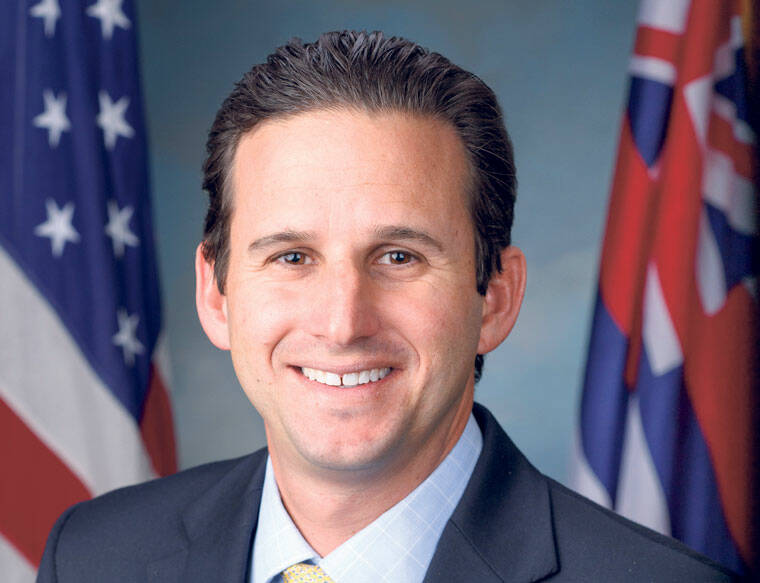U.S. Sen. Brian Schatz, who’s in Hawaii for Thanksgiving, called the $1 trillion bipartisan infrastructure bill President Joe Biden recently signed into law “really great news.”
During a Honolulu Star-Advertiser livestream Wednesday, Schatz described the measure as “the biggest infrastructure investment on the federal side, certainly, in at least 30 years.”
“What does it mean for Hawaii?” Schatz, a Democrat, asked rhetorically. “At least $2.8 billion for the state of Hawaii for roads, harbors, highways, the airports, broadband, our transit systems, our water systems, helping to mitigate against climate change. So these are physical investments over the next three to five years, and they’re designed to last for decades.
“This is not another COVID relief package, or even a stimulus package. This is about looking around our state and seeing dilapidated infrastructure — and finally doing something really significant about it.”
Schatz described Hawaii’s transportation infrastructure as an obvious need.
“The Department of Transportation Highways (Division), they just have a list of projects and programs that need to get done, and they can never get to the bottom of their list,” he said. “And so, you give them more money and they finish more projects.
“The same with the airports and the harbors.”
Hawaii’s senior senator also touted the new law’s provisions for broadband internet connectivity.
“In this bill, there’s $160 million for broadband infrastructure — and $60 million specifically for the Department of Hawaiian Home Lands, to connect Native Hawaiians to the internet,” he said. “And I think what the pandemic has demonstrated to us is … whether it’s work, or connecting with family or health care — or even finding a new job, the internet is an absolute essential. It is not a ‘nice to have.’ It is not for entertainment purposes, although it can be used for that. And there are still tens of thousands of people across the state of Hawaii with no broadband connectivity.”
In response to a question about how quickly the measure’s funds could go to work in Hawaii, Schatz replied, “We certainly want the … county and state government to do stuff quick. But we also need them to do stuff responsibly. And since it’s construction, the design and the plan process really matters, and we want to give them enough space not to just throw it all out there in the next six months.”
According to Schatz, programs such as climate change mitigation will likely take longer.
“There’s not an existing department for that. And so you should expect them to take a year or so to kind of configure the program and spend the money right,” he said.
“For me, the philosophy’s a little different for this money than the previous CARES Act and the American Rescue Plan, where the idea was ‘this is an absolute emergency. You know, businesses are folding. People are in danger of losing their homes. Push the money out as fast as you can.’”
Schatz also expressed enthusiasm about the $1.75 trillion Build Back Better Act, which has passed the U.S. House and is awaiting action in the Senate — where it likely won’t receive as warm a welcome.
“We need to get 50 votes and we probably have 49, right now, and so we’re going to have to have a negotiation to figure out how to land on 50. I’m reasonably confident we’re going to land on 50,” he said.
Schatz said, if passed in its current form, Build Back Better will “reduce the cost of prescription medicine for people on Medicare, massively.”
“People are paying several hundred dollars. sometimes $600 a month for insulin,” he said. “That amount will be capped at $35 a month for any American who needs insulin. So millions of Americans are going to be able to finally afford their insulin. It’s embarrassing that we live in a county where insulin is cheap everywhere across the planet, except here. But we’re finally going to fix that.
“We also are going to cap the total amount that anybody will pay for their prescription medicine — either as a co-pay or direct pay — in a year, to $2,000, down from about $5,000. So that’ll save many seniors, including my father-in-law, about $3,000 a year.”
Schatz also praised other provisions in the measure, including universal pre-kindergarten education and what he described as “the biggest climate bill in American history, getting us probably 80% towards our clean energy goals.”
“I think those things right there are two Congresses worth of progress, all in one bill,” he said.
Email John Burnett at jburnett@hawaiitribune-herald.com.

